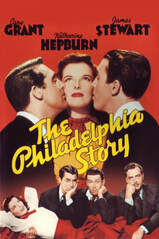|
One of the dozens of things I keep track of in feature films is the language used in reference to female characters. Part of the reason for this is that language is very revealing about filmmakers. It tells us a lot about how well or poorly they think of women. The Philadelphia Story (1940), a romantic comedy written by Donald Ogden Stewart (screenplay), based on Philip Barry’s play, contains four significant named female characters (one girl and three women). The filmmakers convey some regressive messages about women, and these four females are called the following names: a little fiend, a scold, toots, a prig, a perennial spinster and a fat old rum pot. Katharine Hepburn, the lead female, calls herself a man’s faithful old dog, as well as an unholy mess of a girl. She is called hard and told she is acting like a jealous woman. Moreover, her ex-husband, an abusive and alcoholic Cary Grant, says to her and James Stewart, “I thought all writers drank to excess and beat their wives. You know, at one time I think I secretly wanted to be a writer.” Also, Hepburn suggests she would like to choke her little sister. The girl, who wants to follow Grant and Hepburn into another room, says, “Oh please, mother, maybe he’s going to sock her again!” I look forward to sharing my findings about the language used in mainstream movies of the 20th and 21st centuries in my upcoming film guide for women.
© 2019 Alline Cormier
0 Comments
Leave a Reply. |
Categories |


 RSS Feed
RSS Feed